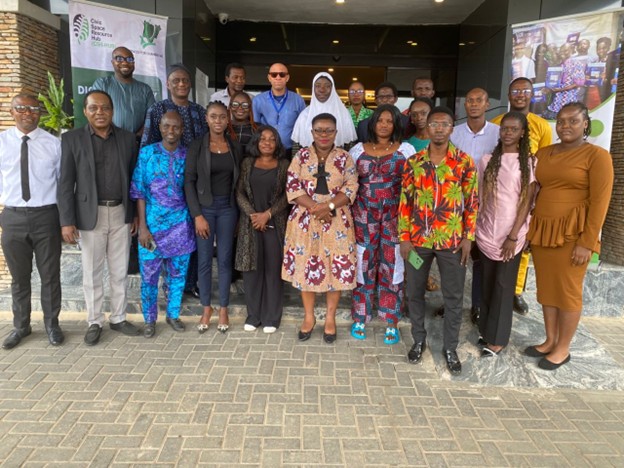By Atim Ekemini-Uba
Basically, the company is like a skeletal framework that derives its flesh and functionality from its stakeholders, investors who have entrusted their resources to help it grow and prosper, and the employees who invest their time and professional reputation for the business concerns to flourish. Therefore, the business of business is business towards accomplishing the goals of the corporation.
Be that as it may, the company needs a conducive and a good working relationship to carry out its business. In this connection, the company goes beyond regulatory mechanisms to give back to the society and care for the communities they work in. By so doing, the company builds and sustains a favorable image amongst the public, its investors and stakeholders. The concept, Corporate Social Responsibility (CSR) evolved from this sense of obligation embedded in “giving back to the society”. It may take the form of human, economic, infrastructural or community development.
Lord Wendell Holmes and Richard Watts define CRS as the continuing commitment by business to behave ethically and contribute to economic development while improving the quality of life of the work force and their family as well as the local community. The European Commission proffers a similar definition of CRS as a concept whereby companies decide voluntarily to contribute to a better society and a cleaner environment; whereby companies integrate social and environmental concerns in their business operations and in their interaction with their stakeholders on a voluntary basis.
CRS also means that companies are required to weave specific humane considerations into their corporate values and long-term business strategies, while operating in a transparent and accountable manner. Being socially responsible is integral to long term businesses growth and success; plays an important role in promoting a country’s values internationally and contributes to the sustainable development of the communities.
WHY CSR is important
It is an established fact that the priority of a company is to do business and make profits. Having said that, the best to do business is by doing it well. Doing it well transcends meeting legal standards, payment of taxes and compliance with regulatory and environmental guidelines, but a commitment to contribute in building a better society. If applied properly, CSR serves as a strategic wealth-creation mechanism for enhancing the competitiveness of business and maximizing the value of wealth creation to the society.
Oil Companies and CSR
As with most businesses, profit maximization is chiefly at the core of business pursuits by oil companies operating in Nigeria, predominantly, in the Niger Delta region of Nigeria. Years of reckless and irresponsible oil operations have devastated the environment and stripped local populations of their traditional livelihoods. The extreme emphasis on profit above environmental wellness has not only fuelled unrest within host communities’, but forced widespread agitations for oil to be left alone in the soil.
Reports have shown that there are over 300 host communities and over 4 million Nigerians in the host communities who are negatively affected by operational hazards of companies which involve:
Health hazards – Gas flares and high volumes of crude oil are spilled into the Niger-Delta environment causing sicknesses like non-lymphatic leukemia, lung and skin cancer, asthma, Type 11 diabetes, sarcomas, bronchitis, cardiopulmonary disease, thyroid, spontaneous abortion and miscarriages, cough, respiratory illness, rhuematod and arthritis. 08036538165
Economic losses – Most communities depend on agriculture as their major source of income. They fish, farm and poach for games but farmlands have been lost to spillage and forest degradation and there have been incidences of acid rains which corrodes corrugated roofing sheets.
Social tensions – In a bid to partake of the oil wealth, there has been an increase in the influx of people into the host communities. So also has crime rates, prostitution, armed violence and other social vices increased.
Adverse impact on the climate – The operation of the companies in the host communities result in the production of greenhouse gases (GHG) such as carbondioxide (CO2) and methane associated with gas flaring which has brought about global climate change and global warming. The ecological system has been seriously affected due to the melting glaciers, increase in global temperatures, excessive rainfall and uncontrolled flooding, coastal erosions and earthquakes.
Oil spills – Examples include: Shell’s 1978 spill caused by tank failure at Forcados Terminal in which 580,000 barrels of crude were spilled; Texaco’s Funima-5 offshore blow out in 1980 that released 400,000 barrels of oil; Mobil’s spill at Idoho in 1998 with a reported release of 40,000 barrels of crude oil; The Shell Spill in 2008 at Ikot Ada Udoh where a capped well failed and spewed an unreported amount of crude oil for months before it was stopped; Agip oil spills at Kalaba, Bayelsa State raged for over two months starting from February 2009 before it was stopped; Exxon oil spills at Ibeno, Akwa Ibom State in May & June 2010; Shell’s Bonga Spill- 40,000 barrels? December 2011; ExxonMobil Spill at Ibeno – 25km off shore – 9 November 2012.
National Oil Spill Detection and Remediation Agency (NOSDRA) informs that there are about over 3400 oil spills in the past 4 years. Rather than address these injustices, oil companies are known to evade responsibility for their wrong doings. In many cases, they either co-opt or pay monies to hand-picked community leaders and members with the intent of buying their silence, and brazenly encouraging acts that are clearly against the interest of indigenous peoples. Likewise, companies allege sabotage claiming that harm occurring is as a result of illegal acts of persons from the community and they’re not to be blame.
To address this monumental pollution and devastation of the environment, companies that are socially responsible and sympathetic to the plight of local people are what the Niger Delta region needs. They need companies that compensate and check the hazards their operations unleash on the populace. While it could be said that CSR is not accorded a human right status, businesses should be done rightly by respecting the rights of people that may be impacted by their corporate conduct.
CSR is purely a philanthropic gesture that goes to the root of the companies’ goodwill and existence, promoting healthy working relationship with host communities. It then follows that corporations must explore and strategize on new ways to address the social, economic and environmental impediments of doing business while balancing conflicting demands on their attention time and resources. They must therefore, look beyond solely how to make the more money to include a wider commitment of building a better society.
Conclusion
The major impediment against CSR is its voluntary nature, including the absence of enforceable rules and regulation or guidelines. Recognizing that corporations have made various contributions to the welfare, development and welfare of host communities, evidence shows that oil company-sponsored projects do not match the oil wealth they extract. Even where evidence of sensible investment in community development projects abounds, oil companies’ CSR initiatives do not translate to a waiver of compliance with environmental regulations. The proposed Petroleum Industrial Bill has provided for a Host Community Fund, an Environmental Remediation Fund and compensation for destruction where any occurs. It must be emphasized that government should perform its duty of providing basic amenities to avoid its citizenry from being handed peanuts as gratuitous gift and favors from oil companies.
Atim Ekemini-Uba, a legal practitioner, works with Spaces for Change




